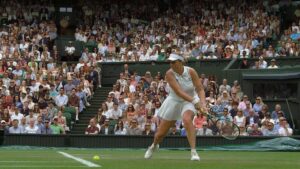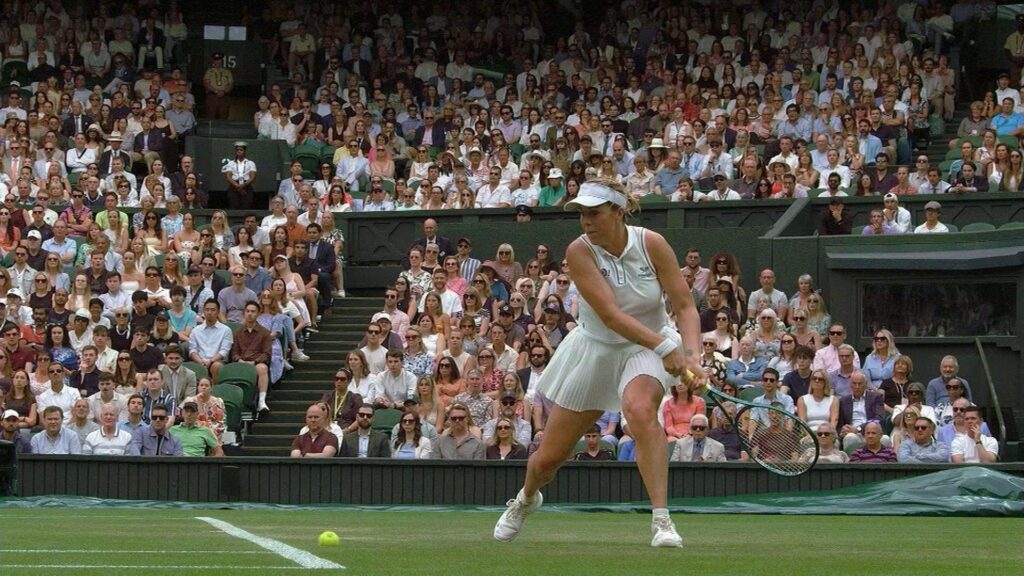**Wimbledon Apology: Human Error in Electronic Line Calling System**
In a startling turn of events during the Wimbledon Championship, organizers issued an apology after the electronic line-calling system on Centre Court was inadvertently shut down, leading to several missed calls during a game. The controversy sparked significant debate among players and officials alike as the incident raised questions about the reliability of the technology in high-stakes scenarios.
The incident occurred during a tense fourth-round match between Russian player Anastasia Pavlyuchenkova and Sonay Kartal of Great Britain. During the match, Pavlyuchenkova claimed that a crucial point was “stolen” from her when a shot from Kartal was not called out, leading to confusion and frustration. After the ball sailed long, Pavlyuchenkova stopped her play, expecting the umpire to announce the point. However, an “out” call was never made.
Chair umpire Nico Helwerth paused the match to clarify the situation. The All England Club initially attributed the oversight to “operator error,” suggesting that the electronic system had been inadvertently deactivated during a critical moment. In a statement following an internal review, a spokesperson revealed that the technology was temporarily disabled due to an error on the server’s side, resulting in three affected calls that went unreflected by the line-calling system.
Interestingly, Helwerth had already made two previous calls in the absence of the electronic assistance, unaware that the system was non-functional. The All England Club expressed regret over the situation, stating clearly, “We have apologized to the players involved. We continue to have full confidence in the accuracy of the ball tracking technology,” although acknowledging that this particular occurrence stemmed from human oversight. The incident has prompted the organization to re-evaluate their processes to mitigate such errors in the future.
Had the system functioned appropriately, Pavlyuchenkova would have won that point—and consequently, the game—rather than replaying it, which allowed Kartal to seize the moment and take a 5-4 lead. A review of the television footage confirmed Pavlyuchenkova’s assertion, clearly showing that Kartal’s shot had indeed gone out, which further fueled the controversy.
Returning to her chair visibly upset, Pavlyuchenkova voiced her frustration to the umpire, stating, “How do I know? How can you prove it? You took the game away from me … They stole the game from me.” The incident is particularly noteworthy since this was the first year that the automated line-calling system was implemented at Wimbledon, adding pressure on the new technology amidst existing doubts from players regarding its reliability.
Prominent tennis figures, including staff members and players like Britain’s Emma Raducanu and Olympic champion Belinda Bencic, have similarly expressed concerns over the technology’s reliability, questioning the accuracy of recent calls and prompting discussion among players. Raducanu mentioned that she perceived some calls as “dodgy,” while Bencic appealed for a more meticulous review process, suggesting that electronic line-calling might not have been ready for such a significant event.
Debbie Jevans, chair of the All England Club, expressed her confidence in the technology, which was introduced based on player requests, emphasizing that while the innovation aims to streamline the officiating process, the recent failure complicates the trust in its accuracy.
Ultimately, this incident illustrates the impact of technology on traditional facets of tournament play, raising essential considerations for future events regarding the balance between technological advancements and athletic integrity. The success of such systems depends not only on their technical accuracy but also on the human decision-making processes surrounding their implementation, particularly in a setting as prestigious as Wimbledon. As the tournament progresses, attention will remain on the effectiveness of the electronic calling systems and their role in modern tennis.











